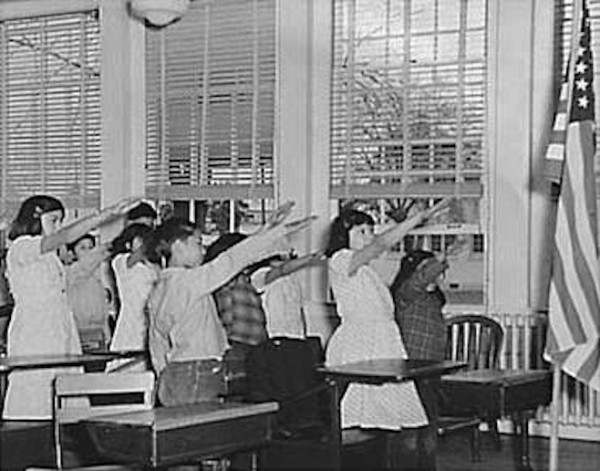NEEDVILLE, TX–A high school freshman in Texas has grown “really tired of our government taking advantage of us.” Subsequently, Mason Michalec decided his ten years of pledging fidelity to United States were over last Friday.
“I basically said it from the time I was in kindergarten to earlier this year and that’s when I finally decided I was done saying it,” the 15-year-old told KHOU-TV.
After he refused to stand, his teacher allegedly said, “This is my classroom. This is the principal’s request, you’re going to stand.” When he continued to remain in his seat, the teacher wrote him up and sent him to the principal’s office.
His punishment was a two-day suspension, and threats of further in-school suspension if he continues to exercise his First Amendment rights. “I’m angry, frustrated and annoyed that they would try to write me up for something I have the right to do,” Michalec lamented.
While the student has his detractors and supporters, his case isn’t anything new. Disputes about the constitutionality of the Pledge of Allegiance have reached the Supreme Court multiple times.
In the 1940 case Minersville School District v. Gobitis, the Supreme Court ruled that the pledge was a positive thing. Justice Felix Frankfurter wrote, “The ultimate foundation of a free society is the binding tie of cohesive sentiment.”
Three years later, that ruling was challenged in West Virginia Board of Education v. Barnette. Despite occurring during the patriotic fervor of World War II, the Court issued an opinion remarkably protective of student First Amendment rights. The Court wrote that school boards must engage in “scrupulous protection of Constitutional freedoms of the individual … [so as] not to strangle the free mind at its source and teach youth to discount important principles of our government as mere platitudes.” The Court reasoned that the First Amendment free-speech clause included the right not to speak.
Considering the origins of the Pledge of Allegiance, it may be a good idea to just scrap the concept altogether. As seen in the photo accompanying this article, our nation’s youngsters once hailed Old Glory using the Bellamy salute. The salute’s namesake, Francis Bellamy, was a famous Christian socialist who authored the Pledge of Allegiance in 1892 to increase sales for his flag business.
Over the course of the 1920s and 1930s, the salute took on a darker connotation as Italian fascists and Nazis began using it. The United States called for the salute to be amended, which Congress did on December 22, 1942. Since then, students across America have adopted the hand-over-heart salute as they recite words that have lost meaning for students like Mason Michalec, who probably watched this clip from Whitest Kids you Know.
[about_faith]





7 comments